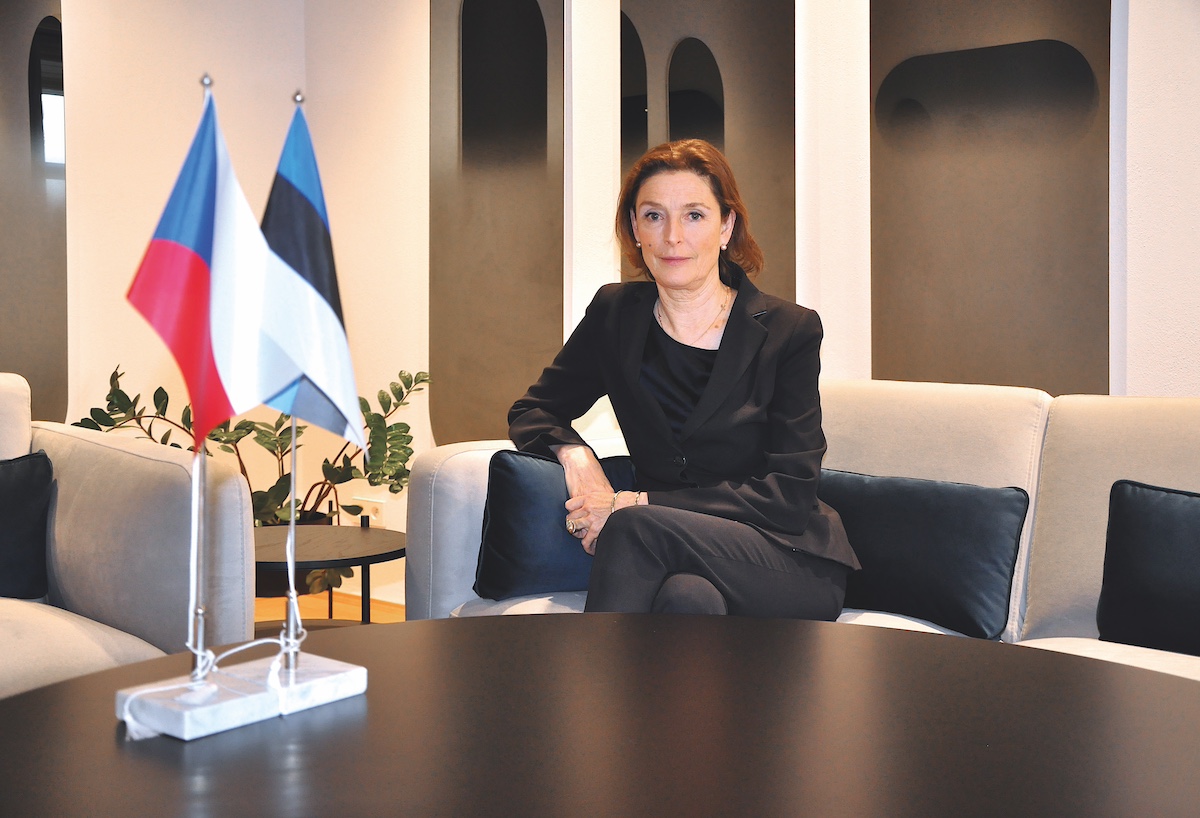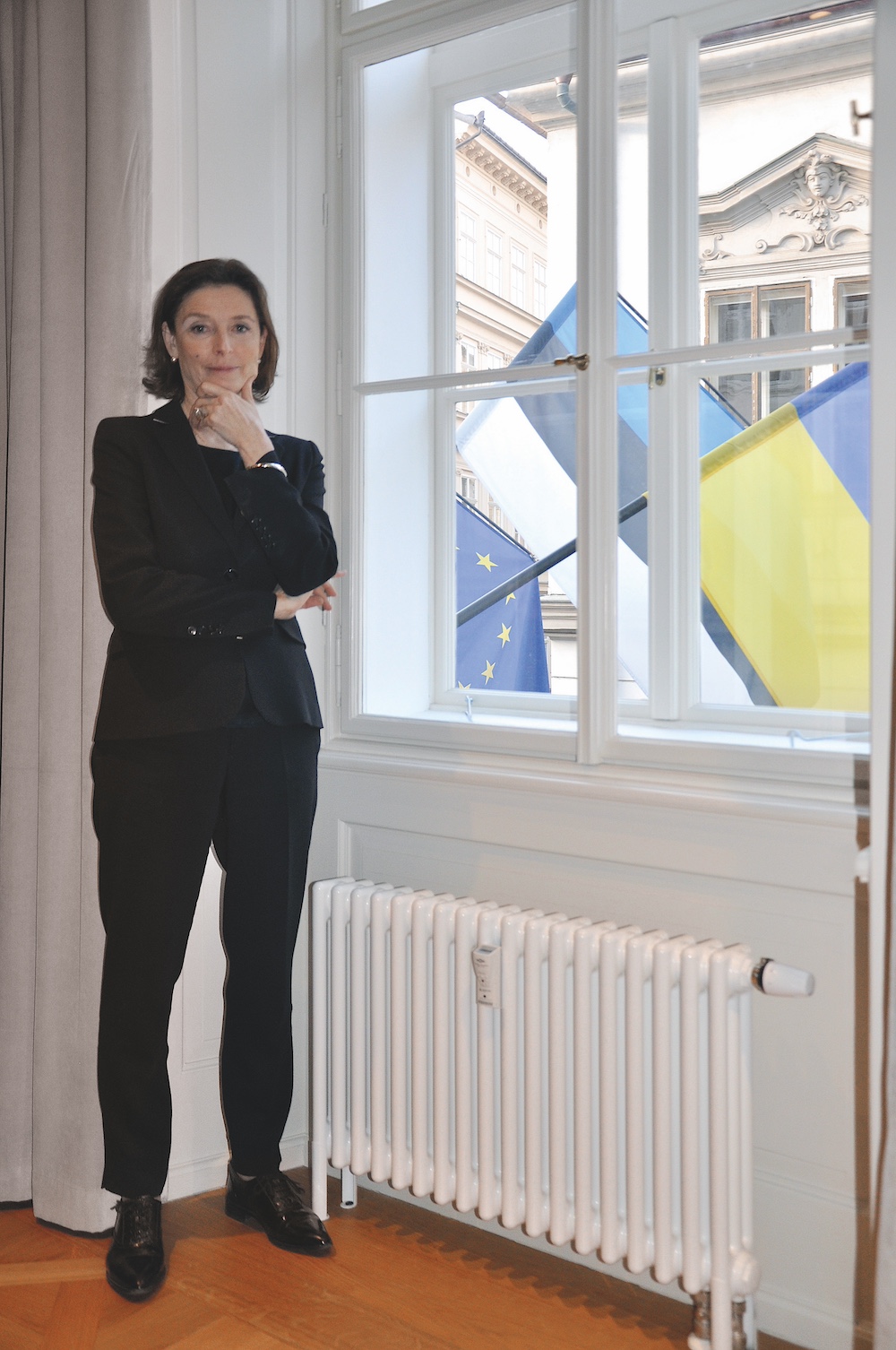“Suddenly, everything acquired a larger significance”

H.E. Ms. Gita Kalmet, Ambassador of Estonia
Text: Martina Hošková, M. Zisso; Photos: Archive
“I have noticed that some people still think that the Republic of Estonia was formed after the collapse of the USSR, which is not true, so I deliberately mention the first Republic of Estonia 1918-1939,” points out H.E. Ms. Gita Kalmet, Ambassador of Estonia. “When I arrived in the Czech Republic to assume my role as Ambassador, we celebrated the 100th anniversary of diplomatic relations between Estonia and Czechoslovakia. A year later, on 24th February 2022, Estonia’s Independence Day, the war began. Suddenly, everything acquired a larger and more profound significance.”
Tell us about yourself, please.
I was born in Estonia, in the old and historic capital city of Tallinn, where I also went to school and university. Back then, we couldn’t travel anywhere in the free world. I could only think and dream about travelling. I remember going to the airport sometimes during my university days –just like that, I liked the atmosphere, and the feeling. I liked to imagine that I too could fly abroad somewhere. I must have dreamed so efficiently that now these foreign lands of my dreams are part of my profession.
You were also an actress for some time, and your whole family is in this field. Does your talent help you be a better diplomat?
It depends on what you mean by talent. If (you mean) the ability to impersonate someone else on stage – which actually requires a keen eye, and perhaps a more sensitive, intuitive sense towards other people, a certain perspicacity – then yes, this could be considered a useful attribute for a diplomat.
How did you become an ambassador?
I am a career diplomat, not a political appointee, which means that before becoming an ambassador I worked for many years in the Estonian Foreign Service. Entering the Foreign Service, a person may think that she would like to become an ambassador, just as a child learning the alphabet may want to become a writer. What will become of this wish in the future depends on the person’s perseverance and talent, but certainly also on luck. And the definition of luck in this situation can mean whether you are surrounded by the right people – those who notice your work and want to support and promote you.
When Estonia reestablished its independence in 1991, and had again become an independent country like in 1918-1939, the Estonian Diplomatic School was also founded. This is where my path to the Estonian Foreign Service began. I deliberately mention the first Republic of Estonia in 1918-1939, because I have noticed that some people still think that the Republic of Estonia was formed after the collapse of the USSR, which is not true. My generation grew up with grandmothers and grandfathers who all remembered and told us about Estonia’s independence. This idea of Estonia’s independence and freedom has shaped me in many ways.
Which countries have you served in so far?
I have worked in embassies in France, the Netherlands, and Canada, and now in the Czech Republic, but, in addition, I have worked for shorter periods in Bosnia-Herzegovina and Great Britain. Any country you have ever served in will never be foreign to you again. Let’s say that you still follow the developments there from the corner of your eye. I have learned a lot from these postings. For example, I was in Bosnia after the war in Yugoslavia, and what I experienced there made me much more humble, and taught me humility in the face of the disaster that people have gone through there.
What is the most difficult part of being an ambassador?
I guess what someone likes or dislikes about being an ambassador varies from person to person. Rather, I would see it as a great responsibility, but also a privilege, to represent the country.
A responsibility, because the homeland expects you to be its eyes and ears in a foreign country, that you notice everything and pay attention 24/7. Sometimes it might get a little overwhelming.
A privilege, in the sense that you can live in a foreign country and get to know it from the inside, so to speak. Your host country even supports and assists you in every way. Thanks to your work, you can see wonderful places, meet admirably smart people, read books, listen to music, and explore art that you were not familiar with before – what else can you call that but a privilege?
Is that what you do in your free time?
In this regard, my favourite time is Saturday and Sunday mornings because they belong to me, the day itself can be spent writing reports. In spring and summer, I go with a book over the Petřín hill to the Kinský garden, and sit on a bench and read in front of a small pond and a waterfall. This is pure luxury. Last summer, I read Madeleine Albright’s “Prague in Winter” on weekend mornings like this. It’s not an easy read, a little bit at a time. The early hours of the morning are quiet, there is not a soul in the park, only me and Madeleine. Albright is an excellent guide to Czech history. In her tactful way, she conveys to the reader her deep affection for Czechia, which permeates the entire book.
Can you give a piece of advice to the next generation of ambassadors?
When trying to think about whose advice has influenced me most as a diplomat, it was probably Sir Robin Fearn, a former distinguished British diplomat. I was lucky to have a chance to study at Oxford University’s Foreign Service Programme, and Sir Robin was our tutor. I have benefited a lot from his tactful counsel. Honesty, dignity, and respect towards the other, I believe, were the keywords for serving as a diplomat. He taught us to never yield to the temptation to make things look better in our reporting, never exaggerate, never forget… and, of course, a diplomat must have a healthy dose of curiosity, a desire not only to learn about his country of residence but also to understand it.
I can say with full conviction that technical solutions have not changed the nature of diplomacy much – despite the fact that we live in a digitalized world, and can communicate with each other using all possible technical gadgets, there is no better means of communication than meeting another person face to face.

“History is not some sort of abstract concept. Our life is simply a continuation of history.”
You have already been in the Czech Republic for over two years. Can you share some of your impressions and highlights?
My arrival in Prague was already a highlight in itself. It was late at night; we drove through the dimly lit empty streets of the old town to Malá Strana. The atmosphere was pretty mesmerizing. Strangely, I felt as if I knew the place. The feeling reminded me of Andersen’s fairy tale ‘The Princess and the Pea’, where the princess made her way through the winding streets of the city to the gate of the royal castle. Later, I learned that Andersen might have written this fairy tale in Prague. So, there is something magical about Prague that makes the fantasy work.
One of the highlights that I will definitely not forget was seeing Prague turn blue and yellow within a day of the start of the war in Ukraine.
The response of the Czechs to the war, the readiness to oppose an adversary, to help Ukrainians, and at the same time the tremendous support to Ukrainians – that is the supreme expression of solidarity.
What is the current status of Czechia – Estonia relations?
In 2021, when I arrived in the Czech Republic, we celebrated the 100th anniversary of diplomatic relations between Estonia and Czechoslovakia. Together with our Latvian and Lithuanian colleagues, we wrapped up those 100 years into a beautifully-designed exhibition without giving much thought to the history that we were presenting, until history, we could say, caught up to us – in 2022, on February 24th, on Estonia’s Independence Day. The war began. Suddenly, everything acquired a larger and more profound significance. We understood that history is not some sort of abstract concept. Our life is simply a continuation of history. In the Czech language war is válka. Regrettably, that is one of the first words I picked up in Czech without making an effort to learn.
Estonia’s relations with the Czech Republic have always been cordial, even friendly, but distant in a way. Ukraine has brought us together, since suddenly we became brothers in arms. In the EU and NATO, we are very likeminded partners and allies.
This interview is done on the occasion of your national day. What are you wishing for both of our countries today?
Since February 24 is Estonia’s birthday, the biggest gift to Estonia would be if Ukraine wins the war and restores its independence and sovereignty. I know that Czechia would also be very happy with the same gift.
I wish that neither Estonia nor the Czech Republic will be tested by history again, as our nations were tested in the last century, so that neither Estonia nor the Czech Republic should feel again that they are left alone… as they once were in the past…
I wish that the entire military arsenal that both Estonia and the Czech Republic are currently busy acquiring stays in the warehouses, that it is never really needed.

